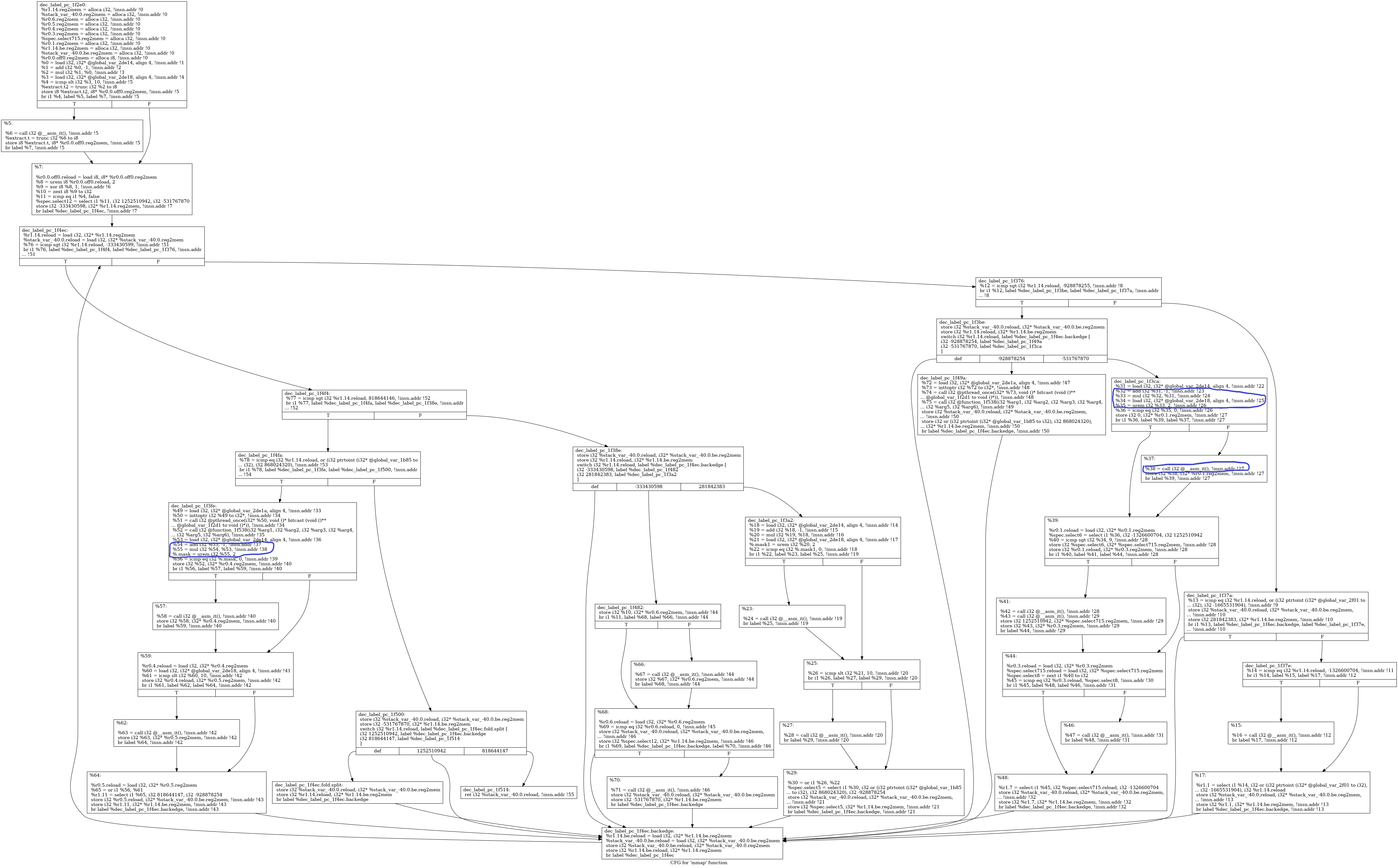利用编译器优化干掉虚假控制流
本人通过断断续续的学习,懂了点llvm的皮毛,简单运用下,介绍一下这两个工具
1.强大的recdec反编译器,项目地址https://github.com/avast/retdec 类似于f5的反编译功能:
capstone2llvmir与bin2llvmir,这个模块通过最流行的capstone反汇编引擎把汇编还原为llvmir,这是此次操作的开始
llvmir2hll,这个模块把llvm ir还原为c代码,这里的效果与f5不相上下
2.llvm10的opt优化与dot画图,用于优化ir和画图看cfg流程
第一步,把so里混淆的函数还原为ir
1.执行retdec-decompiler.py这个脚本
python retdec-decompiler.py libshell-super.2019.so --select-decode-only --select-functions mmap --backend-no-opts --backend-emit-cfg --stop-after bin2llvmir
2.简单画个图看一下,观察这几个需要处理的点:x*(x-1)%2相关的混淆,gloabal全局变量有关的cmp和call i32 @__asm_it()这种引用了保存当前地址的metadata的函数
opt -dot-cfg libshell-super.2019.so.ll
dot -Tpng -o $1.png .mmap.dot

第二步,简单处理ir,替换类型为i32的全局变量global为它的值,类似这种语句
%r1.1 = select i1 %2, i32 or (i32 ptrtoint (i32* @global_var_2f01 to i32), i32 -1665531904), i32 %r1.14.reg2mem.0 @global_var_2f01 = constant i32 6815836
把@global_var_2f01替换为i32 6815836,方便下一步常量传播与死代码消除等优化,关键pass代码如下
bool runOnModule(Module &M) {
for (Module::global_iterator gi = M.global_begin(), ge = M.global_end();gi != ge; ++gi) {
// errs() << "global:" << gi->getName()<< '\n';
GlobalVariable* gv = &(*gi);
std::vector<Value*>obj;
std::vector<Constant*>obj2;
for (User *U : gv->users()) {
if(U->getType()->isIntegerTy()){//这里只替换作为整数使用的global
for (Use &U1 : U->operands()) {
Value *v = U1.get();
obj.push_back(v);
errs() << "valueV:" <<*v<< '\n';
if(cast<GlobalVariable>(v)){
Constant *initializer = gv->getInitializer();
errs() << "valueC:" <<*initializer<< '\n';
obj2.push_back(initializer);
}
}
}
}
for(int i=0;i<obj2.size();i++)
{
errs() << "obj:" <<*obj[i]<< '\n';
errs() << "obj2:" <<*obj2[i]<< '\n';
if(dyn_cast<ConstantInt>(obj2[i])){
obj[i]->replaceAllUsesWith(obj2[i]);
}
}
}
return false;
}
第三步,继续处理ir,把call i32 @__asm_it()这种函数生成的局部变量替换为它的值,方便之后优化,例如下面例子就是 %4就是!5 metadata的值
%4 = call i32 @__asm_it(), !insn.addr !5 !5 = !{i64 127874},把 %4 替换为127874
这里替换之后,不知道为何call语句还没有被清除掉,还需要再循环一次清除所有call i32 @__asm_it()的语句,
bool runOnFunction(Function &F){
Function *tmp=&F;
for (Function::iterator bb = tmp->begin(); bb != tmp->end(); ++bb) {
for (BasicBlock::iterator inst = bb->begin(); inst != bb->end(); ++inst) {
if(isa<CallInst>(inst)){
if(inst->getOperand(0)->getName()=="__asm_it"){
CallInst *instt=cast<CallInst>(inst);
errs() << "getcall:" << *instt << '\n';
MDNode *N = inst->getMetadata("insn.addr");
Metadata *n1;
n1=&*(N->getOperand(0));
Value *v= cast< ValueAsMetadata >(n1)->getValue();
ConstantInt *a=cast<ConstantInt>(v);
TruncInst *t=new TruncInst(a,inst->getType(),"",instt);
errs() << "t:" << *t<< '\n';
instt->replaceAllUsesWith(t);
// instt->eraseFromParent();//这里不知道为啥CallInst没有被清除掉
}
}
}
}
Function *tmp2=&*tmp;
for (auto &B : *tmp2) {
auto It = B.begin();
// we modify B, so we must reevaluate end()
while(It != B.end()) {
auto &I = *It;
if(isa<CallInst>(&I)) {
if(I.getOperand(0)->getName()=="__asm_it")
errs() << "getcall:" << I << '\n';
// we continue with the next element
It = I.eraseFromParent();
} else {
++It;
}
}
}
return false;
}
第四步,去除bcf。
看ollvm的源码可知,bcf主要有两种不可到达分支,一种是工具确定不了值(其实值是确定的)的全局变量,好像叫不透明谓词,这里我用的笨方法,把它们一个一个手工添加上去;
另一种是类似(x*(x-1))%2这种恒为0控制的不可到达分支,原文这么写的
For this, we declare two global values: x and y, and replace the FCMP_TRUE
predicate with (y < 10 || x * (x + 1) % 2 == 0) (this could be improved, as the global
values give a hint on where are the opaque predicates)// values give a hint on where are the opaque predicates
这里我们通过pass把类似(x(x-1))%2或者(x(x-1))&1这种全部优化为0,具体步骤如下
1.手动修复未识别的global数据,通过opt进行sccp+ipsccp常量传播优化,simplifycfg+adcecfg简化和死代码消除优化,-mem2reg促进内存引用为寄存器引用
opt -sccp -ipsccp -simplifycfg -adce libshell-super.2019.so.ll -S
2.-instcombine指令优化,这之后rem取余会被等价优化成and 1,优化后如下
%1 = add i32 %0, -1, !insn.addr !1
%2 = mul i32 %1, %0, !insn.addr !2
%3 = and i32 %2, 1//这里本来是urem指令
3.最关键的,写一个pass识别这种三句模式(x*(x-1))&1的ir,直接替换为0,然后adce+simplifycfg优化掉不可达分支
opt -load libdbcfPass.so -dbcf d2dbcf.ll -S
关键代码如下
bool runOnFunction(Function &F) override {
Function *tmp=&F;
//DEBUG_WITH_TYPE(DEBUG_TYPE, errs() << "charge function:" << tmp->getName() << "\n");
errs() << "Function:" << F.getName() << '\n';
for (Function::iterator bb = tmp->begin(); bb != tmp->end(); ++bb) {
//errs() << "block:" << *bb << '\n';
for (BasicBlock::iterator inst = bb->begin(); inst != bb->end(); ++inst) {
// errs() << "inst:" << inst->getOpcode() << '\n';
// errs() << "inst:" << *inst << '\n';
//if (inst->isBinaryOp()){
// errs() << "inst:" << inst->getOpcode() << '\n';
// errs() << "inst:" << *inst << '\n';
ConstantInt *a=(ConstantInt *)ConstantInt::get(inst->getType(),-1);
ConstantInt *b=(ConstantInt *)ConstantInt::get(inst->getType(),0);
if(inst->getOpcode() == 17){
errs() << "inst:" << *inst << '\n';
BasicBlock::iterator instb=(--inst);
++inst;
// BasicBlock::iterator insta=(++inst);
// --inst;
if(instb->getOpcode() == 13){
errs() << "inst:" << *instb << '\n';
if(instb->getOperand(1) == a){
if(inst->getOperand(1) == instb->getOperand(0)){
// errs() << "inst:" << *insta << '\n';
BinaryOperator *instt=cast<BinaryOperator>(inst);
BinaryOperator *op=BinaryOperator::Create(Instruction::And,b,b,"",instt);
instt->replaceAllUsesWith(op);
errs() << "inst:" << *instt << '\n';
}
}
}
}
//}
}
}
return false;
}
优化过后,所有bcf已经消除了,下面可以继续编译成arm,用ida打开看或者直接反编译为c,可以用retdec-llvmir2hll这个工具,此时就能发现虚假控制流已经没了,下一步可以着手处理其他混淆

还原为c看一下,x*x-1类似的bcf已经全部没有了,只剩下flatten平坦化了
F:retdecbinretdec-llvmir2hll -target-hll=c -output-format=plain -var-renamer=readable -var-name-gen=fruit -var-name-gen-prefix= -call-info-obtainer=optim -arithm-expr-evaluator=c -validate-module -o F:MY_reverselightstarta.c F:MY_reverselightstarta.bc -enable-debug -emit-debug-comments -config-path=F:MY_reverselightstartlibshell-super.2019.so.config.json -max-memory-half-ram
#include <stdbool.h>
#include <stdint.h>
// ------------------- Function Prototypes --------------------
int32_t function_1f538(int32_t a1, int32_t a2, int32_t a3, int32_t a4, int32_t a5, int32_t a6);
int32_t mmap(int32_t a1, int32_t a2, int32_t a3, int32_t a4, int32_t a5, int32_t a6);
// --------------------- Global Variables ---------------------
int32_t g1 = -0x6fffff87; // 0x1b85
void (*g2)() = (void (*)())0x78210048; // 0x1f2d1
int32_t g3 = -0x1d4bfffe; // 0x2de1a
int32_t g4 = 0x68005c; // 0x2f01
// ------------------------ Functions -------------------------
// Address range: 0x1f2e0 - 0x1f51e
int32_t mmap(int32_t a1, int32_t a2, int32_t a3, int32_t a4, int32_t a5, int32_t a6) {
int32_t v1 = -0x13dfbf46;
while (true) {
lab_0x1f4ec_2:;
int32_t v2; // 0x1f2e0
if (v1 > -0x13dfbf47) {
if (v1 > 0x30cb84b2) {
if (v1 == ((int32_t)&g1 || 0x33bd0000)) {
// 0x1f3fe
pthread_once(*(int32_t **)&g3, (void (*)())&g2);
function_1f538(a1, a2, a3, a4, a5, a6);
v1 = 0x30cb84b3;
goto lab_0x1f4ec_2;
} else {
if (v1 < 0x4aa7ccde) {
if (v1 == 0x30cb84b3) {
// break -> 0x1f514
break;
}
goto lab_0x1f4ec_2;
} else {
if (v1 == 0x4aa7ccde) {
v1 = -0x1fb2223e;
goto lab_0x1f4ec_2;
} else {
goto lab_0x1f4ec_2;
}
}
}
} else {
if (v1 < 0x10cc92cf) {
// LeafBlock
v2 = v1 == -0x13dfbf46 ? -0x1fb2223e : v1;
} else {
int32_t v3 = v1 == 0x10cc92cf ? (int32_t)&g1 | 0x33bd0000 : v1;
v2 = v3;
}
v1 = v2;
goto lab_0x1f4ec_2;
}
} else {
if (v1 > -0x375d8eaf) {
if (v1 < -0x1fb2223e) {
if (v1 == -0x375d8eae) {
// 0x1f49a
pthread_once(*(int32_t **)&g3, (void (*)())&g2);
function_1f538(a1, a2, a3, a4, a5, a6);
v2 = (int32_t)&g1 | 0x33bd0000;
} else {
v2 = v1;
}
} else {
// LeafBlock6
v2 = v1 == -0x1fb2223e ? -0x4f125200 : v1;
}
} else {
if (v1 != ((int32_t)&g4 || -0x63460000)) {
int32_t v4 = v1 == -0x4f125200 ? (int32_t)&g4 | -0x63460000 : v1;
v2 = v4;
} else {
v2 = 0x10cc92cf;
}
}
v1 = v2;
goto lab_0x1f4ec_2;
}
}
// 0x1f514
return 0x1f45a;
goto lab_0x1f4ec_2;
}
// --------------- Dynamically Linked Functions ---------------
// int pthread_once(pthread_once_t * once_control, void(* init_routine)(void));
// --------------------- Meta-Information ---------------------
// Detected compiler/packer: gold (1.11)
// Detected language: C++
// Detected functions: 1
最后,我还尝试用它去除flatten,但我的c++和llvm都很垃圾,写的程序一直都跑不起来,希望得到大佬帮助,大概思路如下:
0.把ir中所有switch指令转换为cmp+br指令
1.遍历所有block,如果某个block的Predecessor >6,可能是混淆节点,也就是switch块,标记为ob
2.遍历ob的Successor后续块的Terminator指令,如果是条件跳转cmp+br,getOperand(0)就得到switchvar
3.根据switchvar这个Value类的实例,遍历所有使用这个值的Users ,挑出其中指令为cmp且switchvar为op0的Users,标记为case分发块
其中指令为
4.其余块为真实块
5.根据所有分发块建立二叉树,根节点为ob节点,往下遍历block寻找结尾cmp+br指令,左节点为true,右为false,直到没有br指令或者cmp不为switchvar,就到达真实块
6.根据switchvar的Use往上追踪所有赋值,遇到phi继续追踪直到定值
附录
1.获取metadata的值
!meta.test = !{!0}
!0 = !{"str1", "str2", !1}
!1 = !{!2, !3, null}
!2 = !{"str3", i8 5}
!0=M→getNamedMetadata("meta.test")→getOperand(0)
!2=!0→getOperand(2)→getOperand(0) cast< ValueAsMetadata >(!2→getOperand(1))→getvalue()
2.遍历global,必须要runonmodule,不能runonfuction,只有module里含有全局变量
for (Module::global_iterator gi = M.global_begin(), ge = M.global_end();gi != ge; ++gi) {
GlobalVariable* gv = &(*gi);
}
3.清除无用call语句
Function *tmp2=&*tmp;
for (auto &B : *tmp2) {
auto It = B.begin();
// we modify B, so we must reevaluate end()
while(It != B.end()) {
auto &I = *It;
if(isa<CallInst>(&I)) {
if(I.getOperand(0)->getName()=="__asm_it")
errs() << "getcall:" << I << '\n';
// we continue with the next element
It = I.eraseFromParent();
} else {
++It;
}
}
}
